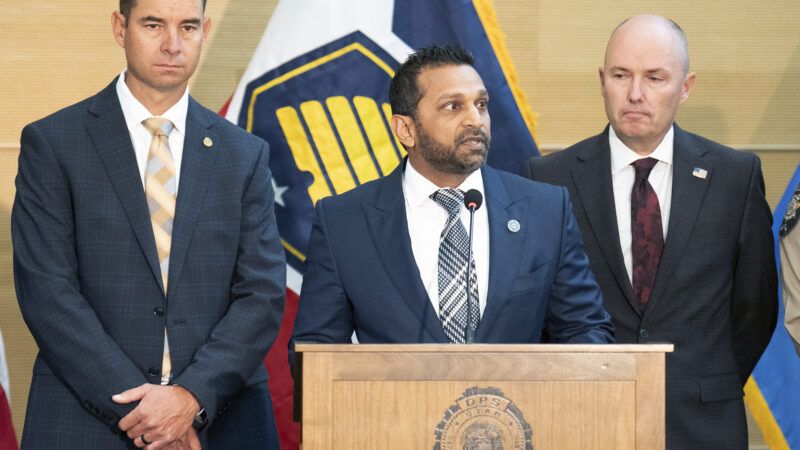FBI Blunders and Internet Panic: How the Search for Charlie Kirk's Killer Went Off the Rails
The alleged shooter was turned in by his family and roommates while the surveillance state remained clueless.

Authorities announced on Friday morning that they made progress in solving a mystery that has gripped the nation for two days: who murdered conservative activist Charlie Kirk with a rifle during a crowded event at Utah Valley University.
Utah Republican Gov. Spencer Cox told reporters that 22-year-old Tyler Robinson had been turned in by his family after he "confessed to them or implied" his guilt in the assassination. A roommate also showed police Discord chat messages from Robinson about hiding a rifle, according to Cox, who said that Robinson acted alone.
Without those tips, it's hard to know how long the manhunt would have gone on for. The night before, authorities had signaled that they were completely stumped. Officials pleaded with the public for information based on a few grainy surveillance stills on Thursday night, and Utah Public Safety Commissioner Beau Mason told NBC News that authorities had "no idea" where the shooter was.
Progressive critics—as well as conservative consigliere Chris Rufo—have accused FBI Director Kash Patel of bungling the investigation. Patel had caused major confusion by implying on social media that the FBI had caught the shooter, only to announce that the "subject" had been released after interrogation. That man, who was completely innocent, suffered a flood of threats after his name and photo were publicized.
Adding to the confusion, police were also filmed escorting a local elderly gadfly out of the event while the crowd blamed him for the shooting. And to make matters worse, internet sleuths misidentified him as yet another innocent person who was nowhere near Utah at the time.
Of course, chaos and mistakes are an unavoidable part of crises. Thankfully, none of these mistakes led to anyone's death, as they have in the past. It will take a while for the full story behind the Kirk investigation to come out, to understand which errors were understandable and which were inexcusable.
At the very least, the manner of Robinson's arrest throws cold water on the idea that mass spying and heavy-handed police powers are the solution to dramatic crimes. In his post lambasting Patel's leadership, Rufo also called for "a campaign to disrupt domestic terror networks" and "to investigate, infiltrate, and disrupt the violent movements—of whatever ideology—that threaten the peace in the United States."
But it's not clear that more aggressive political surveillance would have stopped or caught the suspected assassin. The photos that identified him came from old-fashioned security cameras in a hallway, which captured him walking up a stairway and then jumping off the roof after the assassination. Robinson's father, a longtime sheriff's deputy, reportedly recognized his son from the photos and told him to turn himself in.
Meanwhile, the release of the surveillance photos had led to a flood of tips that wasted the authorities' time. At the Thursday night press conference, Cox said that authorities were sifting through 7,000 tips from the public.
"It is clear they do not know the name of the suspect, that they don't have a cellphone track, they don't have fingerprints, DNA, or digital footprint," journalist John Solomon, who is close to Patel, told Fox News after the press conference. "And that's why they're putting so much personally identifying information up, to try to help get the public to find something that's there."
And the assassination did not come out of an organized political network that could be infiltrated. Although there are signs pointing to a left-wing motive—Cox said that a family member told police that Robinson was angry about Kirk coming to Utah because of his political beliefs—Robinson seems to be, like many other shooting suspects, a lone wolf who spent too much time on the internet.
An internal law enforcement bulletin, leaked to the press, initially reported that the shooter had written messages about "transgender and anti-fascist ideology" on bullet casings. Those turned out to be a mix of references to the video game Helldivers 2 (which features killing fascists) and lewd jokes. "If you read this you are gay LMAO," one of the casings read. Another mocked the "furry" fetish subculture.
An eccentric personality with no criminal record who plays lots of video games and dislikes conservatives is a pretty broad profile, one that covers potentially millions of people. Most of them are neither violent nor members of organized political "networks" that could be disrupted. If the past few days are any indication, encouraging mass online reporting of anyone suspicious can actually make the police's job harder.
Using Kirk's murder to tighten government restrictions would not only be ineffective at preventing more incidents like it. It would also be an unfortunate rebuke to Kirk, who often preached freedom over control.


Show Comments (257)